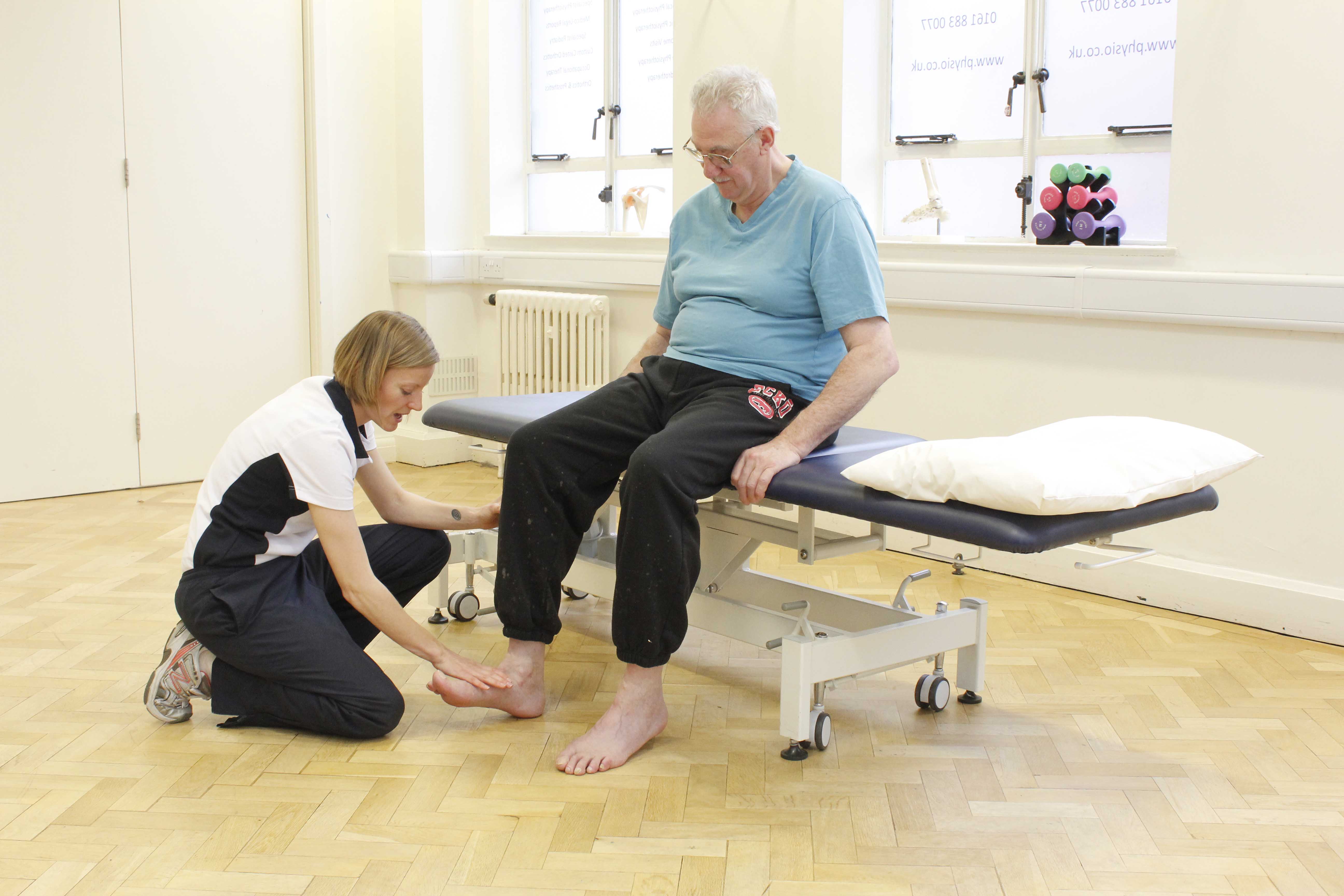What is a transient ischaemic attack?
A transient ischaemic attack or TIA usually refers to a ‘mini stroke’ where there is a brief disruption in the blood supply to the brain causing a temporary loss of brain function. Symptoms of a TIA often mimic that of a stroke and include muscle weakness, reduced sensation, difficulty speaking and problems with balance and coordination. TIAs are often warning signs that a person is at risk of a stroke and the blood supply to the brain might not be functioning properly due to narrowing of an artery or if it is blocked by a blood clot.
 Above: Neurological physiotherapist supervising ankle dorsi flexion exercises to regain effective mobility
Above: Neurological physiotherapist supervising ankle dorsi flexion exercises to regain effective mobilityDiagnosis of a TIA
People should act fast and seek medical attention if they suffer from stroke like symptoms as there is no way to tell whether symptoms are from a TIA or an acute stroke. A prompt physical evaluation and brain imaging (CT scan) is necessary to confirm a diagnosis of a TIA and determine appropriate treatment.
What causes a TIA?
The most common cause of a TIA is a clot that blocks an artery in the brain. This usually occurs from a build-up of fatty lumps (plaque) in one of the carotid arteries (arteries in the head and neck) that narrows the artery and reduces blood supply to the brain. Alternatively a piece of the plaque can become dislodged and block the artery.
What are the symptoms/effects of a TIA?
The symptoms of a TIA may resolve between 5 mins and 24 hours. However, some people are left with residual weakness and problems with everyday functioning due to loss of blood supply to the brain. The effects of a TIA depend on the area of the brain it affects. The most common long term problem may include:
- Weakness of one side of the body with partial or complete loss of voluntary movement
- Reduced sensation of one side of body
- Difficulty maintaining sitting or standing balance
- Weak facial muscles
- Problems with speech and language
- Problems with vision
- Difficulty swallowing
- Fatigue
Physiotherapy following a TIA
At Physio.co.uk our specialised neurological physiotherapists commonly treat people following a TIA. Physiotherapy treatment should commence as soon as possible in order to utilise the brains capability of changing following damage and to enhance recovery. Many people that we treat who have been discharged from the NHS with ‘no rehab potential’ benefit from physiotherapy treatment and go on to make significant long term improvements. This can be months or years after their TIA.
Our neurological physiotherapists at Physio.co.uk we initial assess your current level of function and set some short and long term treatment goals suited to your individual needs so that you reach your optimum potential. Physiotherapy will be focused on:
- Increasing head and trunk control
- Enhancing awareness of midline and joint sense
- Improving muscle strength and flexibility
- Normalising tone
- Promoting normal movement
- Encouraging movement of the affected limb
- Improving transfers
- Increasing independence with rolling, moving in bed, sitting, standing and walking
- Improving posture
- Improving balance and coordination
- Enhancing physical fitness
- Reducing pain
- Improving quality of life
Physiotherapy treatment will depend on your individual needs but will consist of a graduated rehabilitation program of functional exercises which may include:
- Practicing functional activities such as rolling, sitting, sit to stand and walking.
- Activities to improve stability of the trunk.
- Exercises to facilitate normal movement patterns and get the affected side of the body working more effectively.
- Graduated exercise program includingstretching and strengthening activities to lengthen tight muscles and increase muscle strength which will make everyday tasks much easier.
- Balance training focusing on sitting and standing balance to help maximise mobility.
- Teaching transfers (getting in and out of bed, wheelchair, car, shower/bath, on and off toilet).
- Advice about orthotic devices walking aids and specialist equipment if necessary.
- Hydrotherapy treatment.
- Manual handling training sessions for carers and families which will include therapeutic handling, transfers and positioning techniques to increase comfort and promote postural alignment. The therapeutic use of hoist and slings can also be taught.
For more information to get an idea of your rehabilitation potential or to book an appointment please call 0330 088 7800.

 0330 088 7800
0330 088 7800


































